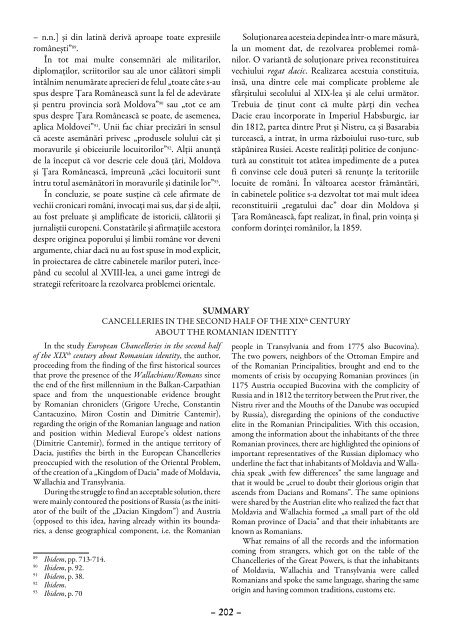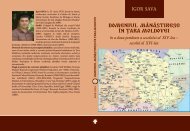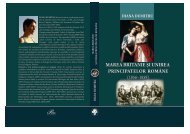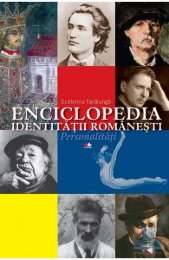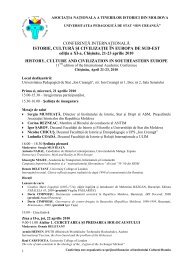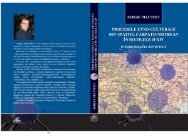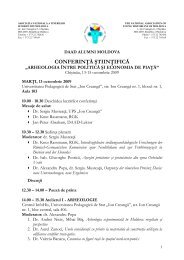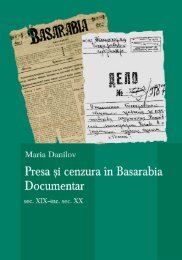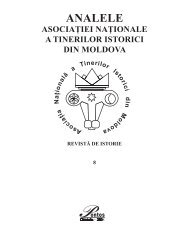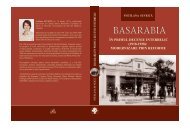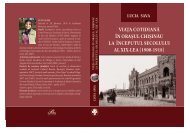aici - Asociatia Tinerilor Istorici din Moldova
aici - Asociatia Tinerilor Istorici din Moldova
aici - Asociatia Tinerilor Istorici din Moldova
Create successful ePaper yourself
Turn your PDF publications into a flip-book with our unique Google optimized e-Paper software.
– n.n.] şi <strong>din</strong> latină derivă aproape toate expresiile<br />
româneşti” 89 .<br />
În tot mai multe consemnări ale militarilor,<br />
diplomaţilor, scriitorilor sau ale unor călători simpli<br />
întâlnim nenumărate aprecieri de felul „toate câte s-au<br />
spus despre Ţara Românească sunt la fel de adevărate<br />
şi pentru provincia soră <strong>Moldova</strong>” 90 sau „tot ce am<br />
spus despre Ţara Românească se poate, de asemenea,<br />
aplica Moldovei” 91 . Unii fac chiar precizări în sensul<br />
că aceste asemănări privesc „produsele solului cât şi<br />
moravurile şi obiceiurile locuitorilor” 92 . Alţii anunţă<br />
de la început că vor descrie cele două ţări, <strong>Moldova</strong><br />
şi Ţara Românească, împreună „căci locuitorii sunt<br />
întru totul asemănători în moravurile şi datinile lor” 93 .<br />
În concluzie, se poate susţine că cele afirmate de<br />
vechii cronicari români, invocaţi mai sus, dar şi de alţii,<br />
au fost preluate şi amplificate de istoricii, călătorii şi<br />
jurnaliştii europeni. Constatările şi afirmaţiile acestora<br />
despre originea poporului şi limbii române vor deveni<br />
argumente, chiar dacă nu au fost spuse în mod explicit,<br />
în proiectarea de către cabinetele marilor puteri, începând<br />
cu secolul al XVIII-lea, a unei game întregi de<br />
strategii referitoare la rezolvarea problemei orientale.<br />
Soluţionarea acesteia depindea într-o mare măsură,<br />
la un moment dat, de rezolvarea problemei românilor.<br />
O variantă de soluţionare privea reconstituirea<br />
vechiului regat dacic. Realizarea acestuia constituia,<br />
însă, una <strong>din</strong>tre cele mai complicate probleme ale<br />
sfârşitului secolului al XIX-lea şi ale celui următor.<br />
Trebuia de ţinut cont că multe părţi <strong>din</strong> vechea<br />
Dacie erau încorporate în Imperiul Habsburgic, iar<br />
<strong>din</strong> 1812, partea <strong>din</strong>tre Prut şi Nistru, ca şi Basarabia<br />
turcească, a intrat, în urma războiului ruso-turc, sub<br />
stăpânirea Rusiei. Aceste realităţi politice de conjunctură<br />
au constituit tot atâtea impedimente de a putea<br />
fi convinse cele două puteri să renunţe la teritoriile<br />
locuite de români. În vâltoarea acestor frământări,<br />
în cabinetele politice s-a dezvoltat tot mai mult ideea<br />
reconstituirii „regatului dac” doar <strong>din</strong> <strong>Moldova</strong> şi<br />
Ţara Românească, fapt realizat, în final, prin voinţa şi<br />
conform dorinţei românilor, la 1859.<br />
89<br />
Ibidem, pp. 713-714.<br />
90<br />
Ibidem, p. 92.<br />
91<br />
Ibidem, p. 38.<br />
92<br />
Ibidem.<br />
93<br />
Ibidem, p. 70<br />
SUMMARY<br />
CANCELLERIES IN THE SECOND HALF OF THE XIX th CENTURY<br />
ABOUT THE ROMANIAN IDENTITY<br />
In the study European Chancelleries in the second half<br />
of the XIX th century about Romanian identity, the author,<br />
procee<strong>din</strong>g from the fin<strong>din</strong>g of the first historical sources<br />
that prove the presence of the Wallachians/Romans since<br />
the end of the first millennium in the Balkan-Carpathian<br />
space and from the unquestionable evidence brought<br />
by Romanian chroniclers (Grigore Ureche, Constantin<br />
Cantacuzino, Miron Costin and Dimitrie Cantemir),<br />
regar<strong>din</strong>g the origin of the Romanian language and nation<br />
and position within Medieval Europe’s oldest nations<br />
(Dimitrie Cantemir), formed in the antique territory of<br />
Dacia, justifies the birth in the European Chancelleries<br />
preoccupied with the resolution of the Oriental Problem,<br />
of the creation of a „Kingdom of Dacia” made of Moldavia,<br />
Wallachia and Transylvania.<br />
During the struggle to find an acceptable solution, there<br />
were mainly contoured the positions of Russia (as the initiator<br />
of the built of the „Dacian Kingdom”) and Austria<br />
(opposed to this idea, having already within its boundaries,<br />
a dense geographical component, i.e. the Romanian<br />
– 202 –<br />
people in Transylvania and from 1775 also Bucovina).<br />
The two powers, neighbors of the Ottoman Empire and<br />
of the Romanian Principalities, brought and end to the<br />
moments of crisis by occupying Romanian provinces (in<br />
1175 Austria occupied Bucovina with the complicity of<br />
Russia and in 1812 the territory between the Prut river, the<br />
Nistru river and the Mouths of the Danube was occupied<br />
by Russia), disregar<strong>din</strong>g the opinions of the conductive<br />
elite in the Romanian Principalities. With this occasion,<br />
among the information about the inhabitants of the three<br />
Romanian provinces, there are highlighted the opinions of<br />
important representatives of the Russian diplomacy who<br />
underline the fact that inhabitants of Moldavia and Wallachia<br />
speak „with few differences” the same language and<br />
that it would be „cruel to doubt their glorious origin that<br />
ascends from Dacians and Romans”. The same opinions<br />
were shared by the Austrian elite who realized the fact that<br />
Moldavia and Wallachia formed „a small part of the old<br />
Roman province of Dacia” and that their inhabitants are<br />
known as Romanians.<br />
What remains of all the records and the information<br />
coming from strangers, which got on the table of the<br />
Chancelleries of the Great Powers, is that the inhabitants<br />
of Moldavia, Wallachia and Transylvania were called<br />
Romanians and spoke the same language, sharing the same<br />
origin and having common traditions, customs etc.


